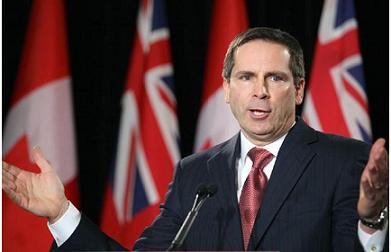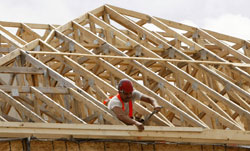Just because it’s been a few months, doesn’t mean we all forgot about it!
The GST & PST is still going to be harmonized, and I recently came across a great article in the Financial Post by James McKellar.
Here it is, verbatim…

“HOME IS WHERE THE TAX IS”
Ontario’s impending tax harmonization scheme spells disaster for those building, buying, or selling homes.
By James McKellar
Financial Post

The recently announced harmonization of the GST and PST in Ontario is about to wreak havoc on the housing industry, one of the pillars of that province’s economy. It is a textbook case of poor government policy that will distort the province’s housing market over the long term, with a particularly devastating impact on the building industry.
Consider the following: When tax harmonization in Ontario takes effect in July, 2010, someone buying a new condo in Toronto costing $500,000 – the current median price in that city, will pay approximately $40,000 in additional taxes. If the same buyer considers moving up to a $600,000 purchase, the tax goes up another $17,000 for a total additional tax burden of close to $60,000. Total sales tax on a new home purhcase will exceed the 13% tax on an imported luxury car and the 15% sin tax levied on a glass of wine or pint of beer purchased at the local watering hole. But will new home purchasers be willing to pay these sky-high sales tax increases and, if not, what are the consequences?
The unintended short-term consequence is the likely delay or even cancellation of some “shovel-ready” housing projects that are in the pre-sale stage. This does not bode well for labour markets and particularly a construction industry that, according to Statistics Canada, is already suffering among the highest job losses of any industry in the country. Why is government intent on spending taxpayer money to create infrastructure jobs and bail out the auto industry, all in the name of job creation, and at the same time charting a course to bring much of the housing industry to its knees?
Hardest hit will be people living in the Greater Toronto Area (GTA). The provincial government indicates that 75% of new home purchases in Ontario fall below the $400,000 threshold. But in the GTA, 54% of new home purchases last year were predominately high-rise condominiums, and in Toronto, where the majority of new condominiums are being built, the average asking price is currently just over $500,000.
For the consumer, there is one way to dodge the tax: Buy on the resale market where PST and GST do not apply. For a $600,000 resale purchase, the tax savings would total $78,000. But the sheer magnitude of the difference in sales tax between new and resale product will distort housing markets in the long run.
How will builders respond to the new tax regime? They will pursue one or more of the following options: Get as much below $400,000 as possible; use cheaper building materials and finishes; eliminate upgrades and even some standard finishes; eliminate sustainability and “green” features if they cost more; strip down landscaping, exterior finishes and features, and keep units small.
Ontario cities can all but forget the drive for new inner city family housing after July 1, 2010. And the province can forget its sustainability and “green” initiatives as well as its intensification targets when it comes to new higher-density housing. Builders will gravitate to projects that fall below the $400,000 threshold or jump to the luxury end where the sales tax bite will not be a disincentive to would-be buyers.
Ontario’s home builders have delivered quality product at a cost that has ranked for decades among the lowest in the Western world. But if the government refuses to move from its current position, the long-term unintended consequences on the performance and efficiency of our housing markets will be significant and long-lasting.
When it comes to home owners, the real losers in the tax harmonization scheme are the middle-income households that are upwardly mobile; those contemplating an expanding family; and the elderly who are considering downsizing. For the ageing couple who might consider a new $600,000 condo in lieu of the family home they have occupied for the last 30 years, why pay $94,950 in sales taxes? They will probably opt to stay put. For the household contemplating children and needing an extra bedroom, a resale unit will be a far cheaper option than a new unit.
Bottom line: the harmonized tax regime will curtain new housing supply in key sectors of the new homes market and will redirect demand to the resale market. In the long run, this will put upward pressure on house prices.
Tax harmonization is beings old on the grounds that it will benefit the Ontario economy at large. In the case of housing, it will do the exact opposite. The crippling new tax regime, announced in the midst of what may be the largest economic contraction since the Great Depression, will undermine one of the essential foundations of a strong economy – housing choices at affordable prices.































McBloggert
at 9:57 am
Thanks for an interesting article Dave. I for one am not a fan of the harmonized tax, however my main objection is not around its impact on the new homes sales but rather the impact it will have on the service industry. I fully believe that builders will find a way to incorporate this tax into their new builds, perhaps it pushes the price of a condo up, but then again with interest rates at historical lows, well that will work out to a dent in the carrying costs (granted not insignificant).
Maybe this new cost will push the entire median price up – if a resale agent now sees that a new build has gone from $550 to $600K maybe they will now price up their 500K resale to $550? I am not a fan of paying more, but let’s face it, we live in a major, international city and the cost of living here when compared to our jurisdictional peers is quite low. If Toronto continues to grow and if we see ourselves as globally competitive metropolis, our infrastructure and services will need continued and enhanced support, translation, more money.
So my overall feeling is that it sucks to pay more, but if this results in a better Toronto, then I am all for it. I think the real attention should be put on the politicians to ensure that Toronto, who is the revenue cow, gets back it fair share of the money to pay for our expansion.